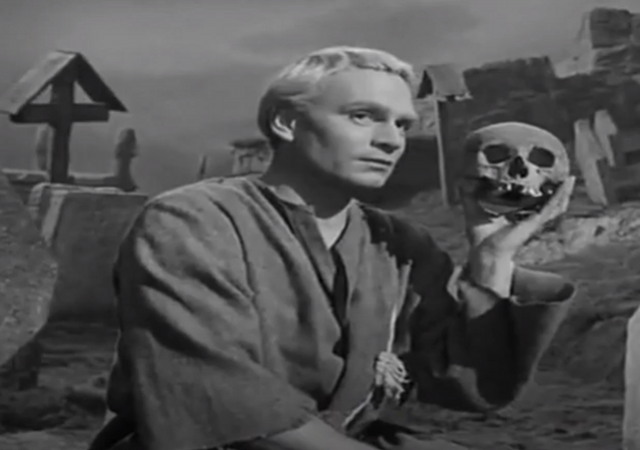Some British Universities Putting Trigger Warnings on Shakespeare Plays and Greek Tragedies
“Tragedy is a genre obsessed with violence and suffering, often of a sexual or graphic kind, and so some of the content might be triggering for some students”

Shakespeare’s works are among England’s greatest contributions to the world. How is this happening?
FOX News reports:
British universities putting ‘trigger warnings’ on Shakespeare, Greek tragedies for being too dark
British universities have reportedly begun putting trigger warnings on great Greek and Shakespearean tragedies for students who may be sensitive to their dark content.
U.K. outlet The Telegraph reported Wednesday that the University of Derby and several other British universities have deemed celebrated tragedies like Shakespeare’s “Hamlet” as “potentially upsetting” for students.
As such, university staff have attached “trigger warnings” to a school literature module that covers classic tragedies, cautioning students that the works are “obsessed” with suffering.
The Telegraph added, “Athenian dramas concerning the deaths of mythical kings, and Arthur Miller’s classic Death of a Salesman, are also on the reading list for the module, which has been given a blanket advisory on how the tragic could be troubling.”
The outlet provided the text of the warning provided by professors for their students, which stated, “Tragedy is a genre obsessed with violence and suffering, often of a sexual or graphic kind, and so some of the content might be triggering for some students.”
The “trigger warning” provided an additional note from the class instructor: “If you feel that your engagement with particular texts or themes is going to present challenges, do speak to me in advance of the class.”
Covering 2500 years of plays, the University of Derby module begins with ancient Greek tragedies, like those from Aeschylus and Sophocles. Both Greek playwrights have stories dealing with murder and dark sexual material.
Donations tax deductible
to the full extent allowed by law.








Comments
What happens when you’re triggered by Shakespeare? Do you be or do you not be?
Well, that *is* the question.
Good one, boss!
“Tragedy is a genre obsessed with violence and suffering, often of a sexual or graphic kind, and so some of the content might be triggering for some students”
Technically, you can take a famous Greek tragedy and just change the last part so that the main character simply doesn’t die in the end… and voila, it becomes a Greek Comedy. The violence and suffering actually don’t count. Like the Three Stooges.
Isn’t there a lot of violence and suffering (sexual and otherwise) in pieces like The Merchant of Venice? A Midsummer Night’s Dream?
Shrek?
All comedies.
I demand trigger warnings on Shrek. NOW.
“ The violence and suffering actually don’t count. Like the Three Stooges.”
Or the Road Runner.
There was that tower jumper in Russia whose chute opened late, and he hit the snow pretty much just like a Road Runner cartoon. When life truly does imitate art. https://www.youtube.com/watch?v=sJ59bNDhJcA
Trigger warnings need a trigger warning.
At least they’re still teaching Shakespeare. Some universities have dropped Shakespeare in favor of authors who are chosen by their race and sexuality.
Butt…but… I thought the Rainbow Flag Brigade claimed Shakespear was GAY!
the problem with removing these works from curricula is that one also removes possible solutions to the pain and anguish depicted. Yes, life sucks. Deal with it. One of the best ways to deal with pain and life-suck is to realize that you are not the FIRST person to deal with pain and injustice. So one reads literature to see how others have dealt with the same pain.
I just watched a zoom adaptation of Antigone with my daughter for one of her classes. Yes, this girl was saddled with a whole heap of injustices starting with her incestuous parents. And she had to deal with the issues. By our modern Disney-formed sensibilities, it has a terrible ending. But one can still learn how to take charge of your own life, and accept consequences for those choices from the titular heroine. It is a great avenue for discussion of issues and choices and “what-if”s
Says more about them than the material.
“Triggering” content in literature — constructions so potent, well-formed and engaging they evoke an actual response in people who encounter them. Or, the point.
These people aren’t objecting because it’s wrong, but because it’s right. Confronting something real changes you. They hate that.
College is apparently for those who believe themselves already sufficient to all things; who just want that belief reinforced for a few years. (“There are those … who flee from the encounters that may change what they believe, believing themselves complete in all of their knowing, and being.” They demand trigger warnings.)
Interesting filtering and signaling function: if you’re put off by the “triggers”, you aren’t competent to deal with this material, and probably suck at the rest of life, too. If you are put off by the warnings, you’re all about protecting your safety bubble.